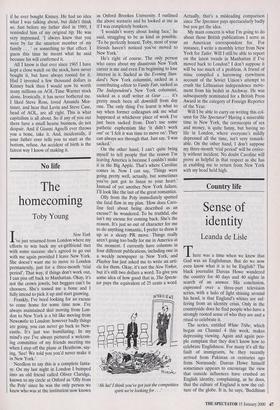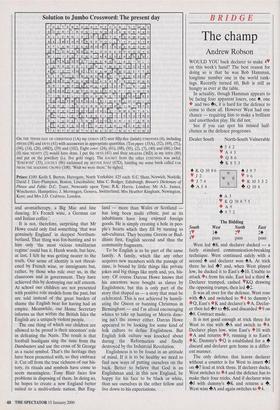Country life
Sense of identity
Leanda de Lisle
There was a time when we knew that God was an Englishman. But do we now even know what it is to be English? The black journalist Darcus Howe wandered the country for 40 days and 40 nights in search of an answer. His conclusion, expressed over a three-part television series, with a halo of light shining around his head, is that England's whites are suf- fering from an identity crisis. Only in the countryside does he find people who have a strongly rooted sense of who they are and a ritual to celebrate it.
The series, entitled White Tribe, which began on Channel 4 this week, makes depressing viewing. Again and again peo- ple complain that they don't know how to celebrate Englishness. For many it's all the fault of immigrants, be they recently arrived from Pakistan or centuries ago from Normandy. Darcus Howe himself sometimes appears to encourage the view that outside influences have crushed an English identity, complaining, as he does, that the culture of England is now the cul- ture of the globe. It is, he says, 'Buddhism and aromatherapy, a Big Mac and line dancing. It's French wine, a German car and Italian coffee.'
It is not, therefore, surprising that Mr Howe could only find something 'that was genuinely England' in deepest Northum- berland. That thing was fox-hunting and to him only 'the most vicious totalitarian regime' could ban it. Harsh words, but here, at last, I felt he was getting nearer to the truth. Our sense of identity is not threat- ened by French wine, or immigrants but, rather, by those who rule over us, in the classroom and in government. They have achieved this by destroying our self esteem. At school our children are not presented with positive role models from the past, but are told instead of the great burden of shame the English bear for having had an empire. Meanwhile, our Home Secretary informs us that within the British Isles the English are a uniquely violent people.
The one thing of which our children are allowed to be proud is their ancestors' role in defeating the Nazis. The result is that football hooligans sing the tune from the Dambusters and use the cross of St George as a racist symbol. That's the heritage they have been presented with, so they embrace it. Cut off from the true richness of our his- tory, its rituals and symbols have come to seem meaningless. Tony Blair faces few problems in disposing of them. In doing so, he hopes to create a new England better suited to a multi-ethnic nation. But Eng- land — more than Wales or Scotland — has long been multi ethnic, just as its inhabitants have long enjoyed foreign goods. He is simply creating a hole in peo- ple's hearts which they fill by turning to sub-cultures. They become Greens or Bud- dhists first, English second and thus the community fragments.
To be English is to be part of the same family. A family, which like any other acquires new members with the passage of time, is bound by little things like private jokes and big things like myth and, yes, his- tory. Of course Darcus Howe knows that his ancestors were bought as slaves by Englishmen, but this is only part of the story that shaped us — a story that must be celebrated. This is not achieved by humili- ating the Queen or banning Christmas in Birmingham — and I'm afraid encouraging whites to take up hunting or Morris danc- ing isn't the answer either. Darcus Howe appeared to be looking for some kind of folk culture to define Englishness. But English folk culture was knocked about during the Reformation and finally destroyed by the Industrial Revolution.
Englishness is to be found in an attitude of mind. If it is to be healthy we need to find new ways of patting ourselves on the back. Better to believe that God is an Englishman and, in this new England, be happy for his face to be black or white, than see ourselves in the other fellow and live down to his expectations.



























































 Previous page
Previous page